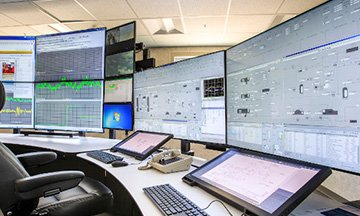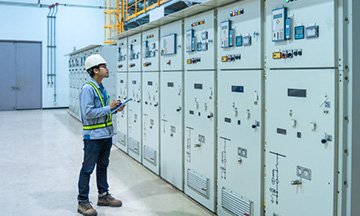Distributed Control System (DCS) Training Course
Course Overview
Why do we need Distributed Control System (DCS) Training? Distributed Control System (DCS) Training Course is designed to make you familiar with DCS’s systems and understand their basic operation.
Through this course, you will be able to program DCS using basic instructions programming and understand the architecture of DCS. If you have worked in an industry, you are probably familiar with DCS systems and understand their basic operation. However, an increasing need today is to also understand how to troubleshoot the typical problems that occur from time to time with your DCS.
How do you learn Distributed Control System (DCS)? You will learn how to program DCS quickly and diagnose problems using your DCS software; know how to connect to the right DCS Controller online, make minor changes to get the machine running and have the expertise to test new ideas and hardware components.
This Zoe training course will empower you with the awareness of the major types of measuring and control instruments and equipment that are used and the principles behind the selection, construction and operation of process measurement and control equipment.
Course Objectives
Upon completing this Distributed Control System (DCS) training course successfully, participants will have an understanding of:
- DCS function in Oil/Gas facilities
- DCS main elements
- Distributed control system architecture
- Control loop concept as a control block
- Typical continuous control loop (Analogue loop)
- Typical Discrete control loop
- DCS power supply
- Power interruption effect on DCS
- Advantages and disadvantages of DCS
- DCS Bailey INFI-90 overview
- Bailey DCS INFI-90 hardware components
- Bailey DCS functional blocks
- INFI-NET data highway interfaces
- DCS alarm management system
- DCS Loop Drawing, typical examples
- LER PCU Cabinet typical layout
- PCU cabinet architecture
Training Methodology
This collaborative Distributed Control System (DCS) training program will comprise the following training methods:
- Lectures
- Seminars and Presentations
- Group Discussions
- Assignments
- Case Studies and Functional Exercises
Zoe Talent Solutions follows the ‘Do-Review-Learn-Apply’ model.
Organisational Benefits
Companies who nominate their employees to participate in this Distributed Control System (DCS) course can benefit in the following ways:
- Keep your company one step ahead with this all-inclusive overview on Distributed Control System (DCS)
- Assist technical committees to create, publish and revise working standards relating to Distributed Control System (DCS)
- Prudently study work related scenarios and case studies to illustrate the material being discussed and ensure that the material is appropriate to the organisation represented
- Leave with an awareness and understanding of their roles and responsibilities in the workplace in relation to Distributed Control System (DCS)
Personal Benefits
Individuals who participate in this Distributed Control System (DCS) course can gain from it in the following ways:
- Understand the principle of operation of a range of sensors and transducers used in the Distributed Control System (DCS)
- Review the construction and operation of the most important Distributed Control System (DCS)
- Evaluate and select the most appropriate sensor technology for a given Distributed Control System (DCS)
- Design, build and test using a given specification of Distributed Control System (DCS)
- Identity components and features of a Distributed Control System (DCS)
- Optimise control by using relevant software of Distributed Control System (DCS)
Who Should Attend?
Distributed Control System (DCS) training course would be suitable for:
- Junior Service engineers and highly qualified technicians in charge of operation and maintenance of instruments & control system
- Beginners, Students and awareness sessions for non-discipline engineers
- Engineers and electricians who want to learn automation systems and DCS programming
- Mechanical and electrical graduates who want to gain practical skills in real-time systems programming
- Computer science and computing graduates who want to add real-time systems programming into their skill sets
- Installation and Maintenance Technicians
- Instrument and Process Control Technicians
- Maintenance Engineers
- Mechanical Engineers and Technicians
- Operations Engineers
- Process Technicians
- Production Professionals
- System Integrators
- Anyone who wants to understand how modern factories are automated
- Fresh Graduates or one/two years experience in automation, control system, instrument or process control engineers
Course Outline
MODULE 1: Recent Trends in Digital Control Systems
- Advances in Computers
- Advances in Communications
- Early Distributed Control Systems
- Open System Interconnection
- Digital Communication Networks
- Software Considerations
MODULE 2: Introduction to DCS
- General
- The Distributed Control Concept
- Distributed Control Configuration
- Networks
- The Human Interface Station (HIS)
- The Operator Interface
- Advantages of DCS
MODULE 3: Main Benefits of DCS
- General
- Highly Reliable Systems
- The Measure of Reliability
- Availability
- Factors Affecting System Reliability
- Task Partitioning
- Redundancy
- Hardware Backup
- Software Backup
- Diagnostics
- Spare Parts
- Power Resources
- External Influences
MODULE 4: Components & Structure of DCS
- DCS Functions and Features
- Basic Elements of DCS
- DCS Components Details
- Data Highway & Networks
- Operator Workstation
- Engineering Workstation
MODULE 5: Distributed Control System Configuration
- General
- The Control Console Equipment
- Hierarchical Configuration
- Loop Configuration
- Continuous Control Loop Configuration
- Data Hi-Way Controller Configuration
- DCS Displays
- Advantages of DCS
- DCS Reliability
- Manual Stations and Analog Controllers
- Mean Time Between Failure (MTBF)
MODULE 6: Openness & Integration with PLC’S
- Openness
- Transmission Protocols
- System Integration
- Programmable Logic Controller Interface
MODULE 7: FIELDBUS Technology
- General
- What is Fieldbus?
- Progress of Fieldbus Standardization
- Recognition as a Standardization Work Item
- Establishment of the Fieldbus Foundation
- Process of Standardization
- Fieldbus Standard Specifications
- IEC/ISA Standard Specifications
- Features of Fieldbus
- Comparison with Conventional Communication
- Fieldbus Communication
- Various Types of Data Transmission
- Advanced Functionality of Field Devices
- Improvement of Transmitter Measuring Accuracy
- Multifunction Equipment
- Considerations in Basic and Overall Design
- System Startup Considerations
MODULE 8: DCS or PLC?
- Either “Distributed Control Systems (DCS)” or “Programmable Logic Controllers (PLC)”
- Benefits of Selecting the “Right” Automation Technology
- Let’s Get Technical Stereotypes Out of the Way!
- The Seven Questions to Ask Yourself Before Selecting a System
- What to consider in Selecting a Process Control System for a Hybrid Application?
- What to consider in Selecting a Control System Supplier for Hybrid Applications?
- Conclusion
MODULE 9: How to Evaluate a DCS System?
- Is Distributed Control the Right Choice?
- DCS System Specification
- Evaluating Questions
- On the Basis of Reliability
- On the Basis of Input/Output
- On the Basis of Configuration
- On the Basis of Highway Capabilities
- On the Basis of Operator Interface
- On the Basis of Installation
- DCS Bailey INFI-90 Overview
- INFI-90 Hardware Overview
- INFI-90 General Overview
- HONEYWELL TDC 3000 DCS
- FOXBORO IA DCS
MODULE 10: System Maintenance
- End Element Maintenance
- LCN Modules Maintenance
- Anti-Static Precautions
- System Self-Testing
- Examination of Error Indications
- Removing Modules from Service
- Off-Process Testing
- Return Module to Service
- Uninterruptable Power Supply (UPS) Systems
- Power Outage











